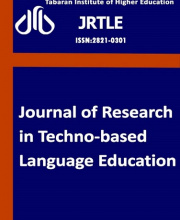۱.
کلیدواژهها:
dubbing Iranian Translators song Subtitling translation strategies
Translation Studies (TS) moved away from the focus on literary translation and linguistic approaches to new types of translation called Audiovisual translation (AVT). Technological advancements affected the development of AVT. Technology created a situation in the world of moving pictures within which subtitling and dubbing take an important role in optimizing communication. Despite the growing interest in AVT, song subtitling and dubbing remain on the periphery of TS. Therefore, this study aimed to identify the differences that may exist between the strategies used for subtitling and dubbing the songs on some special musical animations from English into Persian based on Schioldager et al.’s (2008) twelve micro-strategies. The corpus of this study consisted of three musical animations which are Strange Magic, Moana , and Frozen 2 . This study focused on nine songs in each animation. The songs had meaningful lyrics, established the character(s), aided in the narrative, and made the audience relate to the character or the story. Hence, in the selected animations 27 songs were selected. The data were analyzed using a chi-squared test. The results indicated a statistically significant difference between six out of 12 strategies for dubbing and subtitling the animation’s songs. The differences were related to “Direct Translation”, “Oblique translation”, “Adaption”, “Addition”, “Substitution”, and “Deletion”. The results revealed the most frequent micro strategies used by Iranian translators in dubbing songs were “Oblique Translation”, “Deletion”, “Substitution”, and “Adaptation”. However, “Direct Translation” and “Addition” were the most used strategies in subtitling songs in animations. Thus, it was revealed that the translator in dubbing not only transferred the dialogue from the source text but also considered the source text idea. The findings offered a pedagogical implication for translation students, subtitlers, and dubbers to recognize better the subtitling and dubbing strategies that were being used by translators in the Iranian context.
۲.
کلیدواژهها:
EFL Learners Instagram Pre-intermediate Level Social Network Vocabulary
Instagram is considered one of the most famous virtual social networks among all ages of human beings. Nowadays, the extensive popularity of social networking websites such as Instagram has made new chances for Iranian English teachers and learners. Accordingly, the present study tries to investigate whether Instagram would be a useful learning instrument of vocabulary for Iranian male EFL learners at the pre-intermediate at Shokouh Enghelab English Academy in Babol, Mazandaran, Iran. The participants in this study were 50 male EFL learners, ranging from 8-15 years old, selected randomly from 100 cases. After checking the homogeneity of the participants, they were divided into two groups. The participants in the experimental group were learning English vocabulary through ten Instagram pages for four weeks (12 sessions and 25 minutes per session). But the participants in the control group were only taught by the teacher. Pretest and posttest were applied to evaluate learners' knowledge about vocabulary during the session. Based on the research data, Instagram learning brings valuable technological and pedagogical advantages for Iranian EFL learners despite the popularity of social networks. It has a significantly positive effect on the development of vocabulary learning. The findings of this paper can be helpful in the English methodology issue.
۳.
کلیدواژهها:
CALL DDL corpus linguistics concordancing Vocabulary
Vocabulary learning is at the heart of language learning and language use. It is what makes the essence of a language. Having it in mind, most of the students always complain about lexical problems, and unfortunately, they are unaware of the different tools, which can help the students to learn vocabulary and improve vocabulary retention. A useful tool for learning and teaching vocabulary is a tool that uses authentic samples to enhance comprehension. Concordancing software is one of these digital tools that enable learners to explore billions of real-world materials. In this regard, the present study was conducted to investigate the actual effect of using this software on vocabulary retention. To gain this purpose, a sample of 54 intermediate female EFL students took part in this study. Participants were randomly assigned to two equal experimental and control groups. Before starting the treatment, the researcher gave the pretest to both groups. Then the treatment sessions were started for both groups, which lasted 12 sessions (4weeks); ten vocabularies were taught in each session and during this time the vocabulary of each lesson was taught by using concordancing software to the experimental group and by using a list of vocabulary to the control group. After the treatment sessions, the posttest was administered to both groups. The results of this comparison proved that the use of concordancing software improved learners' vocabulary knowledge. The outcomes have the potential to affect language learners' performance and teachers' beliefs about the effectiveness of using CALL programs, especially concordancing programs.
